So I have a sorting problem. What I want to do is construct an octree around the camera position, copy the leaf node data to a temporary container, then reset the octree and enter a new camera position. After this, check if any of the new node positions are in the old leaf nodes, and only update the data in the positions that have changed. The result should be that the positions closest to the camera have a higher level of detail and a larger number of nodes, as the octree is subdivided based on how close the node's center is to the camera position.
The image below illustrates this simply. If the black boxes represent the octree leaf nodes from the old camera position, none of them would be included in the new set as their centers are not the same as any of the pink boxes.

Obviously, the result I'm getting with my code isn't what it should be. There are huge areas of terrain that don't load the new positions properly/overlap with existing terrain.

I'm using an unordered set for the leaf nodes, as each one's position should be unique, and an unordered map for the chunks I want to load, so that I can load the correct chunk based on the key which is the position of the leafnode.
In the code, I update the list of chunks to create only if the amount of nodes in the world changes: if (tempNodes.size() != _octree->leafNodes.size())
The rest of the logic pertains to what I've already been explaining. It might just be some simple mistake, but I also might just be misinterpreting the way certain member functions work.
void LandscapeManager::updateCenter(glm::ivec3 newCenter)
{
std::unordered_set<Octree*> tempNodes;
tempNodes = _octree->leafNodes;
// reconstruct octree
delete _octree;
_octree = new Octree(glm::vec3(0, 0, 0), glm::vec3(pow(2, 8), pow(2, 8), pow(2, 8)));
// update camera position in octree
_octree->leafNodes.clear();
_octree->insert(newCenter);
std::cout << "Generating: " << _octree->leafNodes.size() << " chunks...\n";
if (tempNodes.size() != _octree->leafNodes.size())
{
// clear chunk list and refresh with new list generated by code below
_chunkLoader.Clear();
for (auto i : _octree->leafNodes)
{
// add a chunk to the chunkloader if it's position does not exist in the old octree's leaf nodes
if (!tempNodes.count(i))
{
_chunkLoader.Add(i->getOrigin(), i->getHalfSize());
}
if (tempNodes.count(i))
{
// remove unchanged leaf nodes from the old list so that all
// the remains is a list of changed leaf nodes, which will be used to delete old chunks
tempNodes.erase(tempNodes.find(i));
}
}
for (auto i : tempNodes)
{
if (_chunks.count(i->getOrigin()))
{
// unload and delete the meshes that have changed
auto unload = _chunks.find(i->getOrigin());
_chunks.at(i->getOrigin())->Unload();
delete _chunks.at(i->getOrigin());
_chunks.erase(unload);
}
}
}
_center = newCenter;
}